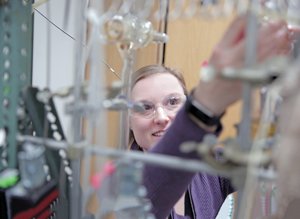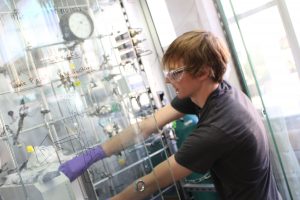BSL Fellowship Fund
Fellowships provide graduate students with critical financial support as they pursue advanced degrees. In the case of the Bird Stewart Lightfoot (BSL) Wisconsin Distinguished Fellowship, a fund established as a permanent endowment for graduate students, those students are linked to three of the most prestigious names in the field of chemical engineering. R. Byron (Bob) Bird, Warren Stewart and Edwin Lightfoot are co-authors of the landmark textbook Transport Phenomena, and individually are research giants—but they also have made significant contributions in teaching and service.
The chemical and biological engineering department provides fellowships, such as the BSL, that support graduate students throughout their first semester, at the end of which they join a faculty member’s lab group and receive funding through research grants of that faculty.
For many students, including alumnus Jeffrey Herron, who received the BSL Fellowship in fall 2008, having financial support in the first few daunting months of graduate school is crucial. "Because I had funding for a year from the department, I had time to explore what options were available, meet with faculty and their students, and see what kind of work I would be taking on," he says. "Having that time, and not going in blind, helped me make a better decision for my research interests. Having that flexibility in funding is important in having a successful graduate career."
Herron, currently a senior engineer at Dow Chemical Co. in Midland, Michigan, is one of 10 students who received the fellowship since the department began offering it in 2007. Ultimately, Herron went on to join Manos Mavrikakis‘ group, specifically applying quantum chemical calculations to the identification of new materials, focusing on applications in energy. In his work with Dow, he helps scale up lab reactions to commercial-scale, often applying similar tools and calculations that he worked on during his graduate research.
|
|---|
Through fellowship funds like that of the BSL, students are given the freedom and flexibility to explore various chemical engineering sub-disciplines, and identify the research that interests them most. They also attend conferences, which often can be the key to focusing in on the research area they want to pursue throughout their graduate career.
For current graduate students Nat Eagan and Maddie Ball, who both received the fellowship in spring 2015, the financial support helped them expand their knowledge of their respective fields. "It gave me the opportunity to get out of the door and see things that I wasn't necessarily at the stage to be a part of yet," Eagan says. "I was able to go to the American Institute of Chemical Engineering conference in Salt Lake City, Utah. I gained a lot of good experience just being there."
 |
|---|
Ball, a student in Ernie Micek Distinguished Chair Jim Dumesic's lab, was able to use the extra funds to travel to the University of New Mexico, where she worked with some of the group's collaborators on electron microscopy. "Getting to work with them, and seeing what they do in the field of catalysis, helped me advance that area of my research," says Ball.
The BSL Fellowship also gives students some latitude in their research. "Having a fellowship means that I'm not tied to a particular project, so I can work on things that are of interest to me and my adviser," says Ball. "In terms of my research, we can do things that are a little more exploratory."
She continues to conduct research in controlled surface reactions, in reference to the synthesis and characterization of bimetallic catalysts. Ball, who really enjoyed the experience of working as a teaching assistant, is currently working with the Delta Program and getting excited about the idea of pursuing a professorship in the future.
The BSL fellowship also helps validate students’ perceptions of their academic path. "Bird, Stewart and Lightfoot were some of the most well known names to come out of the university, with a lot of theories fundamental to the understanding of transport phenomena," Eagan says. "So having my name attached to the fellowship makes the most difference. It tells me that I'm on the right track, and doing the right things."
For Eagan, the fellowship means much more than funding for his graduate education. It's a signal that he and other recipients have potential, an encouragement in the trying early phases of an academic career. He now is a member of Professor George Huber's group.
The BSL fellowship is among several fellowships that help the Department of Chemical and Biological Engineering to remain competitive, enabling it to attract some of the most academically advanced students. Not only does it illustrate the success of the department, it also provides students with the motivation to embrace their research.
Manos Mavrikakis, Vilas Distinguished Achievement Professor and Paul A. Elfers Professor and chemical and biological engineering department chair, highlights the importance of the fellowship, not merely because of the endowment it provides, but in what it signifies. "Bird, Stewart and Lightfoot are three of the most recognizable names in the history of chemical engineering on the global scale," he says. "Having a graduate fellowship with that name is among the highest honors a chemical engineering graduate student can ever imagine."
Make a Gift
Bird, Stewart and Lightfoot Graduate Fellowship Fund
Funding for graduate fellowships is among the department’s top fund-raising priorities. To make a gift or to learn more how you can be a part of this important effort, contact Ann Leahy, ann.leahy@supportuw.org, (608) 308-5501.
Thank you for supporting the BSL Fellowship Fund.
Author: Lexy Brodt

